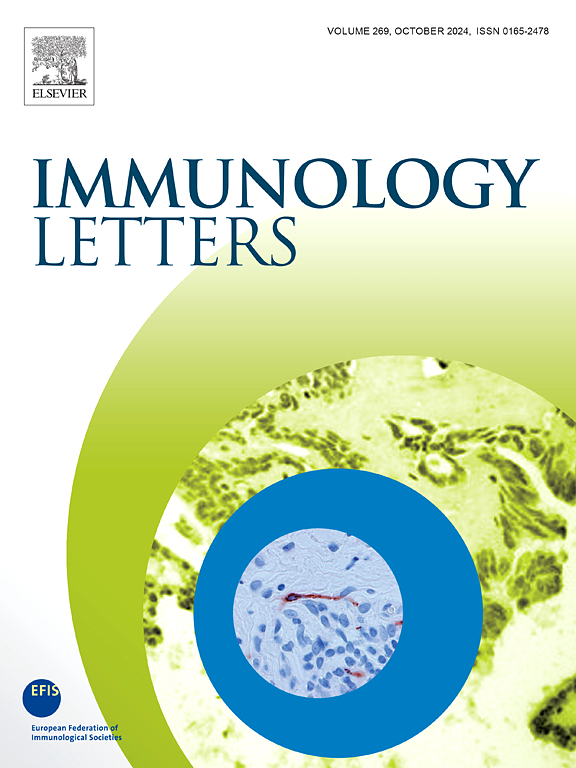Fingolimod, an antagonist of sphingosine 1-phosphate, ameliorates Sjögren's syndrome by reducing the number of STAT3–induced germinal center B cells and increasing the number of Breg cells
IF 3.3
4区 医学
Q3 IMMUNOLOGY
引用次数: 0
Abstract
Background
Sjögren's syndrome (SS) is an autoimmune disease caused by infiltrating lymphocytes. FTY720 affects the S1P signaling pathway, which plays a role in T and B cell migration from secondary lymphoid tissues to target organs. In this study, we investigate the regulatory mechanism of FTY720 in the context of SS.
Method
FTY720 was given orally every day to NOD mice. The salivary flow rate (SFR) and blood glucose level were assayed every 3 weeks. Histopathological features were investigated at the end of the study. In vitro, FTY720 was added to mouse splenocytes, and changes in the lymphocyte subsets were assessed.
Results
In vivo, FTY720 increased the SFR and reduced the blood glucose level. The salivary gland histological score and infiltration of the salivary glands by B and T cells were dramatically decreased. Furthermore, STAT expression in the salivary gland was decreased. In vitro, FTY720 inhibited Th17 cells, while increasing regulatory T (Treg) cells, respectively. Also, FTY720 decreased and increased the numbers of germinal center (GC) B cells and regulatory B cells (Breg cells), respectively. FTY720 decreased the IgG level in culture supernatants. Also, STAT3 activation was decreased by FTY720.
Conclusion
Our results show the therapeutic potential of FTY720 in the context of SS; FTY720 prevents lymphocyte migration from secondary lymphoid organs to target organs.
鞘氨醇1-磷酸拮抗剂芬戈莫德可通过减少STAT3诱导的生殖中心B细胞数量和增加Breg细胞数量来改善Sjögren综合征。
背景:斯约格伦综合征(SS)是一种由淋巴细胞浸润引起的自身免疫性疾病。FTY720 会影响 S1P 信号通路,而 S1P 信号通路在 T 细胞和 B 细胞从次级淋巴组织向靶器官迁移的过程中发挥作用。本研究探讨了 FTY720 对 SS 的调控机制:方法:每天给 NOD 小鼠口服 FTY720。方法:每天给 NOD 小鼠口服 FTY720,每 3 周检测一次唾液流速(SFR)和血糖水平。研究结束时对组织病理学特征进行调查。在体外,将 FTY720 加入小鼠脾细胞,评估淋巴细胞亚群的变化:结果:在体内,FTY720 增加了 SFR,降低了血糖水平。唾液腺组织学评分以及 B 细胞和 T 细胞对唾液腺的浸润显著降低。此外,唾液腺中 STAT 的表达也有所减少。在体外,FTY720 可分别抑制 Th17 细胞和增加调节性 T(Treg)细胞。此外,FTY720 还能分别减少和增加生殖中心(GC)B 细胞和调节性 B 细胞(Breg 细胞)的数量。FTY720 降低了培养上清液中的 IgG 水平。此外,FTY720还能降低STAT3的活化:我们的研究结果表明了 FTY720 在 SS 方面的治疗潜力;FTY720 能阻止淋巴细胞从继发性淋巴器官向靶器官迁移。
本文章由计算机程序翻译,如有差异,请以英文原文为准。
求助全文
约1分钟内获得全文
求助全文
来源期刊

Immunology letters
医学-免疫学
CiteScore
7.60
自引率
0.00%
发文量
86
审稿时长
44 days
期刊介绍:
Immunology Letters provides a vehicle for the speedy publication of experimental papers, (mini)Reviews and Letters to the Editor addressing all aspects of molecular and cellular immunology. The essential criteria for publication will be clarity, experimental soundness and novelty. Results contradictory to current accepted thinking or ideas divergent from actual dogmas will be considered for publication provided that they are based on solid experimental findings.
Preference will be given to papers of immediate importance to other investigators, either by their experimental data, new ideas or new methodology. Scientific correspondence to the Editor-in-Chief related to the published papers may also be accepted provided that they are short and scientifically relevant to the papers mentioned, in order to provide a continuing forum for discussion.
 求助内容:
求助内容: 应助结果提醒方式:
应助结果提醒方式:


